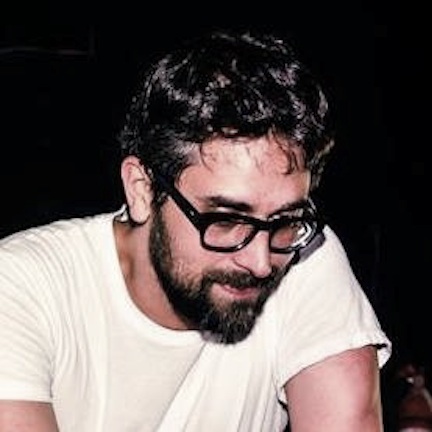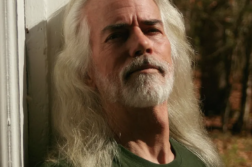RELEASED last fall and now available in home video formats, Four is a gripping and insightful exploration of the lives of four characters who are grappling with their fears and desires around connecting intimately with another person. Adapted from the play Dying City, by Christopher Shinn, Four is a film about loneliness and the lengths to which people will go to form relationships, regardless of the risks and obstacles. With this film, Joshua Sanchez makes his debut as a screenwriter and director of a feature-length movie.
Set in “Everytown, USA,” on a sultry July Fourth, we encounter Joe (Wendell Pierce), a middle-aged, married, African-American professor who has arranged an assignation via the Internet with June (Emory Cohen), a teenage white boy who’s struggling with his sexuality. At the same time, Joe’s daughter Abigayle (Aja Naomi King) is conflicted about her attraction to a former basketball star named Dexter ( E. J. Bonilla), who is poor, uneducated, and from a different cultural and racial background. In addition, there’s the spectral presence of Joe’s wife and Abigayle’s mother, who appears ever so briefly but packs a wallop when she does. Sick and confined to her bed, she’s the focal point of Joe’s guilt and closeted sexuality as well as Abigail’s grief.
What follows is an interview with Joshua Sanchez. A native of Houston and a graduate of Columbia University’s MFA film program, in 2003 he won the HBO Young Producer’s Development Award. He lives in Brooklyn.
Joshua Sanchez: I saw a different play by Christopher Shinn called Where Do We Live? at the Vineyard Theatre in New York in 2005. At the time, I was finishing film school and had made a few short narrative films that were playing at various film festivals, and I was looking to start working on a feature film project. I was asked by PS122 Gallery’s web magazine ArtWurl to interview someone, and, based on what I’d seen in Where Do We Live?, I thought Chris would be a great subject. I read Four while researching for that interview, and it instantly felt right to me. It reminded me of growing up in the suburbs as a closeted gay kid: I could see the environment and movement of the story so visually. Chris and I hit it off right away. He’s around my age and had a similar upbringing. Another filmmaker had the rights to make Four at the time, but that hadn’t panned out. When I found out that the rights were available, I jumped at it.
IJ: You mentioned that you could relate to Shinn’s play because it connected with your own life experience. Can you elaborate on this?
JS: I moved to New York City from Texas, where I’m from, in 1999. I was a very shy young person and didn’t come out until I was 23, around 2000, after moving to New York. I come from a very conservative, Christian, Mexican-American background. I grew up in the Southern Baptist church, so it was really shocking to my family when I came out. My mother basically disowned me and my father died right before I began working on Four—in a car accident—but was very much on a downward spiral for the last part of his life because of severe alcoholism.
By 2005, I’d finished graduate school and I was in the middle of my first serious relationship. I’d also begun to do psychoanalysis in a serious way, which was a big part of my life at that time. It was an interesting and exciting time, but incredibly turbulent. In looking  back on that period, I felt incredibly ill at ease. I was almost thirty and hadn’t really done much to show for my own progression. I also felt very hurt by my family life, and much of my life at this time was devoted to healing from that experience. I remember relating to the sense of longing that the characters have in Four—wanting something transcendent and extraordinary to occur in one’s life but having little means to make something like that happen.
back on that period, I felt incredibly ill at ease. I was almost thirty and hadn’t really done much to show for my own progression. I also felt very hurt by my family life, and much of my life at this time was devoted to healing from that experience. I remember relating to the sense of longing that the characters have in Four—wanting something transcendent and extraordinary to occur in one’s life but having little means to make something like that happen.
IJ: Of the main characters in the film, is there one that you identify with most strongly?
JS: I think June was the character I felt the closest to when I first began developing the project. I think he embodies the conflict and confusion of many gay kids who are struggling to come to terms with their sexuality. His journey felt very close to my own, and I think this was a big impetus for me to make the film. Now when I watch the movie, I feel incredibly close to Abigayle. Her story is so moving and poignant to me. She’s holding so much inside—which I also did as a young person—but has the potential to grow from the experience.
Honestly, at this point in my life I feel like I’ve been each of these characters at certain times. I’ve been the older man in the relationship and have also had older partners, so I’m very familiar with that dynamic. I would have to say I identify the least with Joe. Part of what’s so sad about his character is that he’s such a frightened person. He’s having such a hard time letting go of the shield that he puts in front of himself because he’s terrified of being abandoned and losing everything. I’ve certainly felt fear like that in my life, but I’ve always been able to surrender to the fear and let it go. I certainly feel a lot of empathy for him, but I find myself feeling sorry that he cannot let anyone see who he really is.
IJ: What surprised you about making the film?
JS: When I was pitching the project, film executives in development and distribution would tell me a variation of “it’s too black” or “it’s not black enough” or “it’s too gay” or “it’s not gay enough.” I always felt confident in the quality of the writing and the story, but if you hear remarks like that for years from people who are supposed to be “experts,” it does start to sink in that this story is going to be challenging for many people. When we started screening at festivals, it was apparent right away that the story was hitting people on a gut level. In speaking with a lot of these audiences, I found that the film was really doing its job in terms of presenting a real story that happens to people all over the world and allowing the audience to feel a sense of empathy with the characters.
IJ: In the film you attempt to show not only the external conditions of the characters’ lives but also their inner lives. Did your experience with psychoanalysis contribute to this?
JS: Psychoanalysis was a huge part of my being able to understand and dramatize the internal lives of these characters. I started therapy in 2002 with an analyst that I found through a psychoanalytic center here in New York. Around the time that I started to work on Four, I began a classic four-day-a-week psychoanalysis protocol, which most of my friends thought was total lunacy. Analysis helped me to process a lot of the trauma of my family life and gave me many tools to help me live my life.
What analysis did for me is that it made me comfortable with talking about human emotions and motivations. This is actually an incredible resource to have when you’re dealing with a story, because it enables you to place yourself in a much more subjective position narratively. Especially with material like Four, this is really diving into the complicated nuances of family life. Analysis also made me much more comfortable dealing with actors and being able to put myself in their position of having to portray these characters’ inner lives. They’re the most immediate vehicles for emotion and action on a film set. They’re in the middle of living the lives of these characters and they’re able to speak with them on an emotional level about the “hows” and “whys” of what they are doing.
IJ: Four deals with many themes: love, loss, coming out, race, cultural identity, family, AIDS, illness.
JS: These issues are so much a part of me that it’s hard to really separate my own personal experience with them, and the exploration of them in Four. I think that because I’m an American gay man of color, going through life in the late 20th and early 21st century, these topics are highly relevant to me. I’m very much a product of where I come from, and I don’t really have much other material to work with other than to explore these issues. But I have to say that Four doesn’t give a lot of easy answers to the questions it asks with regard to these topics, though it does feel incredibly cathartic.
I picture myself as a child, feeling completely out of place because I was gay or Latino in a church I didn’t believe in—and I was a child of the ’80s, so every message I got was that the person I was, a gay person, was being punished by god with AIDS. For so long I felt like that horrible picture the church and the conservative culture presented to me of who I was. I know many other people who never got out of thinking that about themselves. That I did transcend this self-loathing is an amazing thing that I’m so thankful for. And to put something out into the world that challenges these notions is personally very gratifying. Film can be such a powerful medium. It’s humbling to think that something I had a part in bringing to the screen could affect people by complicating and challenging the way they think about these issues of identity.
IJ: How has the experience of directing Four changed you?
JS: On a personal level, I wasn’t really sure that I had the strength or ability to see Four all the way through to the end, but I remember feeling like I had to take a chance on it, for better or worse. That began the journey of about eight years, which is the time it took to get the movie off the ground. I’ve learned that I’m much stronger and focused than I thought I was. Even though I tend to be quite introverted in my personal life, I feel completely present and alive on a movie set in the role of director. I have a lot more confidence than I did before because of this experience.
Irene Javors, a psychotherapist based in New York, is the author of Culture Notes: Essays on Sane Living.






